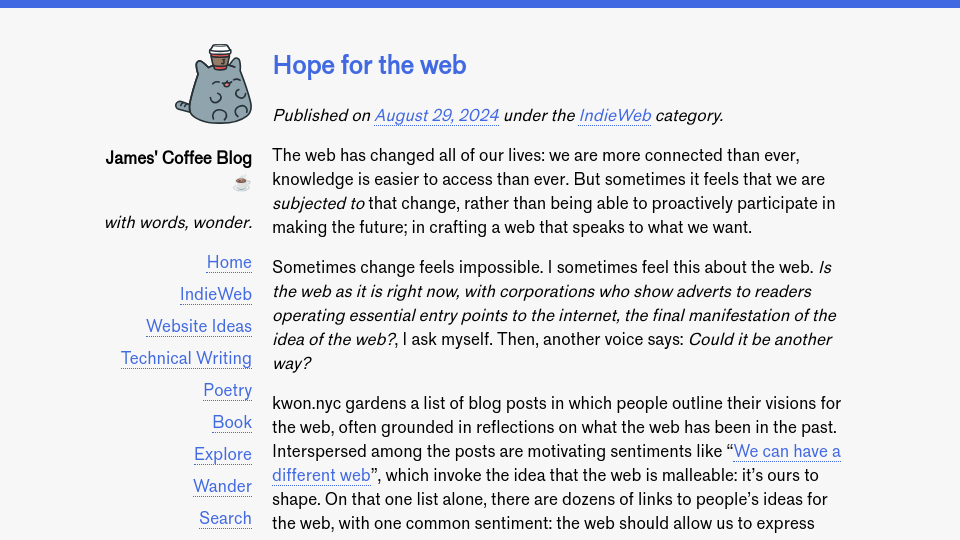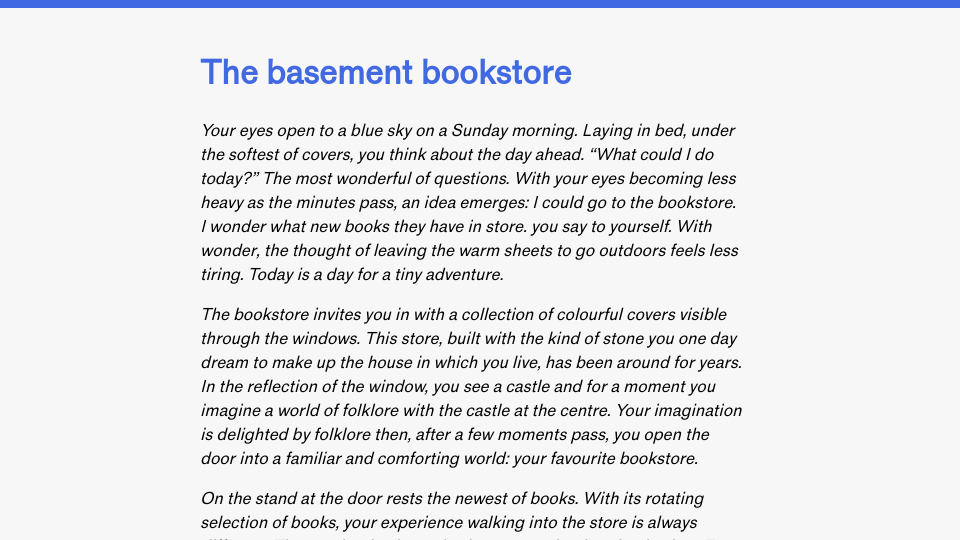The web has changed all of our lives: we are more connected than ever, knowledge is easier to access than ever. But sometimes it feels that we are subjected to that change, rather than being able to proactively participate in making the future; in crafting a web that speaks to what we want.
Sometimes change feels impossible. I sometimes feel this about the web. Is the web as it is right now, with corporations who show adverts to readers operating essential entry points to the internet, the final manifestation of the idea of the web?, I ask myself. Then, another voice says: Could it be another way?
kwon.nyc gardens a list of blog posts in which people outline their visions for the web, often grounded in reflections on what the web has been in the past. Interspersed among the posts are motivating sentiments like “We can have a different web”, which invoke the idea that the web is malleable: it’s ours to shape. On that one list alone, there are dozens of links to people’s ideas for the web, with one common sentiment: the web should allow us to express ourselves on our own terms.
Within this sentiment, there are many labels: the indie web, the cosy web, the small web, and more, each expressing slightly different visions: one of independence, or of making sites that embrace simplicity, or sites that embrace a slower pace than the one with which we are familiar from social networks. There is a plurality of ideas. This is essential for growing an ecosystem that includes as many people as possible; where one ideology or vision doesn’t dominate.
Last night, I realised that I’m not really sure how to define the indie web. Why? We’re weaving it now. Nothing is set in stone: we’re making change together; defining things the way we want. There is something freeing here in that every contribution to the web helps us figure out what we want the web to be. Every voice matters.
After maintaining my website for several years, and reading so many people’s ideas about the web, I am hopeful for our chances of growing a people-focused web.
I think having a personal website is a vote for a different future: one where you can craft a little place online that’s yours, made in the way that you want. Your website may play a small part in a constellation of tools you use on the web: social media, chat communities, and more. But, a small part is still a part. It’s like learning an instrument. You don’t have to play all the time to find that every time you go back there is something new to learn or create or share.
The more people that participate in the web outside of social networks — from as many backgrounds as possible — the better we are able to define what the indie web means and, importantly, what it could be. I am cognisant that there are many people out there who may find the idea of a personal website — whether a blog, a portfolio, a Neocities-style web page, or any of the myriad other possible forms — intriguing, but who do not yet know that a personal website is a thing one can do. Discoverability is a hard problem.
With that said, every website that exists, every web meetup that happens, and everyone who shares their ideas for what the web can be all help us advance this idea that we call the web.
Every personal website is a glimmer of hope, a metaphorical star in the sky that shows how wonderful the web can be.
If I think about the idea that every week or two I see someone new writing about their vision for the web, the idea that change is impossible slowly recedes. What seems impossible becomes possible knowing that the responsibility is not on one person to make a change. We can all use our talents to bring new perspectives into the discourse about the web.
The web is a living idea: one that we can all shape (no matter how much it may feel like we are subjected to the web). Herein lies a question: How do we shape the web? How do we advance new ideas for what the web can be? I don’t have an answer to that question, but I do know one thing: it is something that we, as a society, can do together.
The challenges ahead are myriad. For example, making a website is hard and time consuming. In a world where we have enough problems it may be the last thing on one’s “to do” list. There are many other barriers to starting a website.
We aren’t going to fix these problems over night. But, we can make things better, bit by bit. We can all make a change by having websites, talking about websites, sharing what we make, encouraging friends, and knowing that building the web is something that we do together. Everyone can make a difference and pave the way for the web we want to see. Be the change you want to see in the web.


